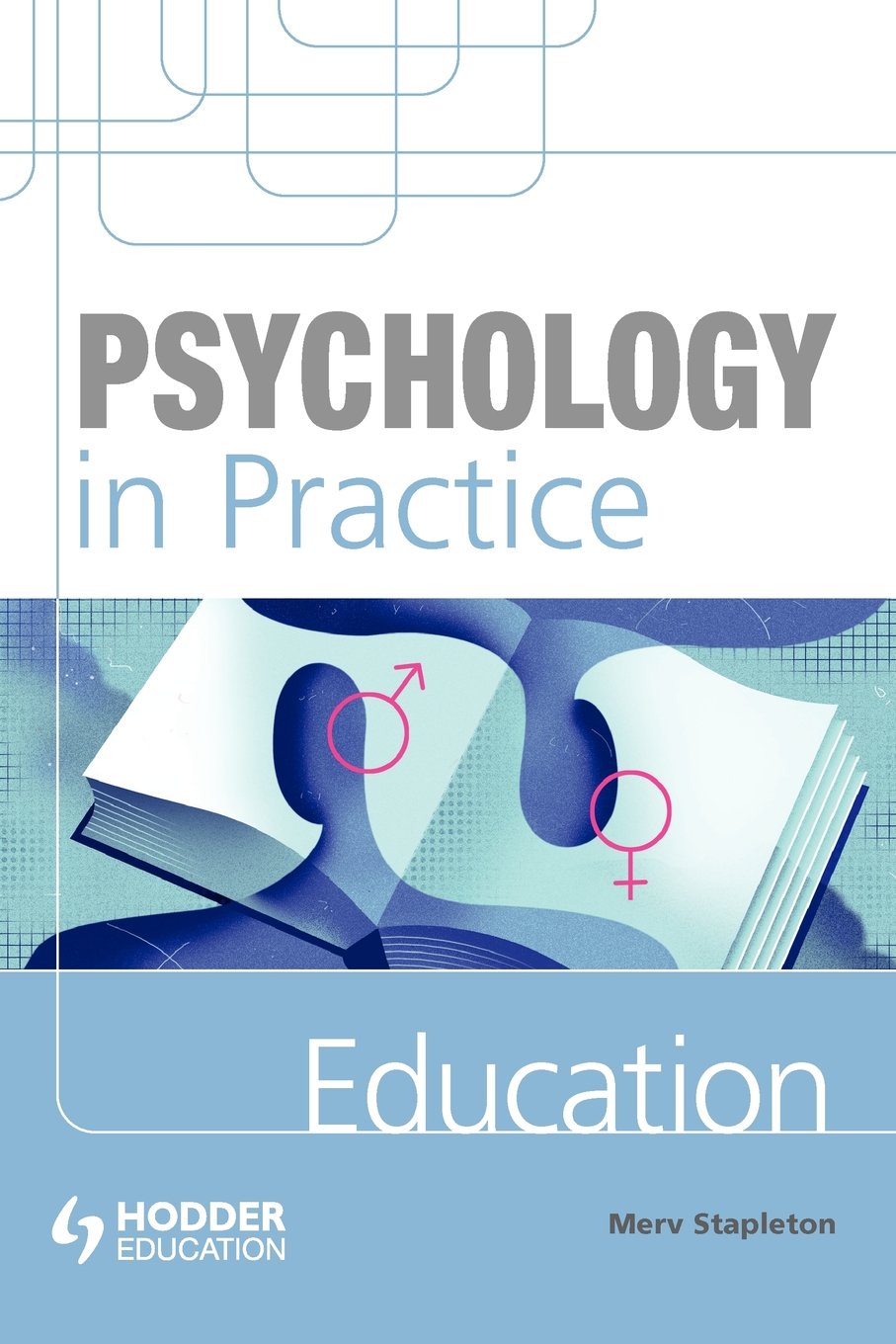
Psychology In Practice: Education (Psychology In Practice Series)
FREE Shipping
Psychology In Practice: Education (Psychology In Practice Series)
- Brand: Unbranded

Description
Find an area or areas of learning difficult e.g. are having trouble learning to read or remember things Ms. Montero Gil had been balancing subsequent doctoral studies with her role as the youngest member of Spain’s Congress of Deputies, representing Madrid. She later postponed her studies to become Spain’s Minister of Equality, an office that advocates for equal opportunity regardless of age, gender, or disability. Plato’s foremost pupil, Aristotle, emphasized how learning involves building associations such as succession in time, contiguity in space, and similarities and/or contrasts. Behaviorism equates learning with observable changes in activity (Skinner, 1938). For example, an assembly line worker might have “learned” to assemble a toy from parts, and after 10 practice sessions, the worker can do so without errors within 60 seconds. They found that the prefrontal cortex of the brain, involved in planning and monitoring of complex cognitive activities, was significantly activated in teachers, not when they planned hints to be given, but only when they actually gave the hints.
As well as working with children who experience a wide range of needs, we work a lot with parents, teachers and other professionals. This work is wide ranging and benefits all children. Some examples of this type of working include: Johann Herbart (1776–1841) is considered the founder of educational psychology as a distinct field. He emphasized interest in a subject as a crucial component of learning.Such proactive behavioral supports include maximizing structure in classrooms, teaching clear behavioral expectations in advance, regularly using prompts with students, and actively supervising students (Simonsen & Myers, 2015). There are lots of other tools that EPs can use to carry out a cognitive assessment with children and young people. A popular and effective way is to do a dynamic assessment with a child or young person. AB - The role of educational psychologists (EPs) in supporting the mental health and wellbeing of children and young people is increasingly being recognised in light of pressures on support services, and the identified importance of school-based provision. At the same time, EP practice has benefitted from psychological practice frameworks which support formulation and decision-making although, to date, none of these has focused on therapeutic work. This paper proposes a flexible, practical model, based on the constructionist model of reasoned action (COMOIRA) and informed by cognitive behavioural therapy, human givens therapy and motivational interviewing. It offers practical guidance and structure for EPs engaging in direct therapeutic work with children and young people, complementing guidance from the Division of Educational and Child Psychology (DECP) on the delivery of therapeutic approaches in school and communities. Further research and development of this model is encouraged by the authors.
Takeuchi, N., Mori, T., Suzukamo, Y., & Izumi, S. I. (2019). Activity of prefrontal cortex in teachers and students during teaching of an insight problem. Mind, Brain, and Education, 13, 167–175. Over 2,500 schools across the United States now apply the PBIS supportive behavioral framework, with documented improvements in both student behavior (Bradshaw, Waasdorp, & Leaf, 2012) and achievement (Madigan, Cross, Smolkowski, & Stryker, 2016). 2. CognitivismEducational psychologists have typically earned either a master’s degree or doctorate in the field. Every child is unique, as is every class, teacher, parent or carer and so every solution needs to be carefully considered and any suggestions need to be right for everyone involved. While certain suggestions or actions might be right for a school, they might not be right for a particular child. EPs will most often want to work with different people to jointly solve a problem. Teachers have expertise about their classrooms and the curriculum. Parents and carers have deep expertise and knowledge about their children. EPs have expertise in child development and psychology. For parents and teachers, we recommend Dr. Gabriella Lancia’s article on Healthy Discipline Strategies for Teaching & Inspiring Children. This article offers basic and effective strategies and worksheets for creating a positive behavioral climate at home and school that is pro-social and pro-learning.
Cognitive tests can tell us what a child can do in the test situation with no help or encouragement (we sometimes call this mediation). Having a conversation can often be the most useful way of trying to understand what is going on, from different perspectives. Parents, teachers and children will all have different views about ‘the problem’ and it’s important to try to understand these views. EPs might call these conversations different things e.g. a consultation or a joint problem solving conversation. Other recent research has focused on behavioral interventions to support online learning, which is increasingly prevalent as an educational option. It can be difficult for school staff to have the time to carry out an in-depth, focused observation and so sometimes an EP might spot things that have previously been missed. EPs might carry out observations in lots of different ways e.g. at different times, in different places. This is because we know that children and young people can behave in different ways in different environments. Cognitive assessment
Scope
Dynamic assessments (as the name suggests) are ways of working with a child or young person that help people understand a few things: This theory states that besides the traditionally measured verbal and visual–spatial forms of intelligence, there are also forms that include kinesthetic or athletic intelligence, interpersonal or social–emotional intelligence, musical or artistic intelligence, and perhaps other forms we have not yet learned to measure.
- Fruugo ID: 258392218-563234582
- EAN: 764486781913
-
Sold by: Fruugo
